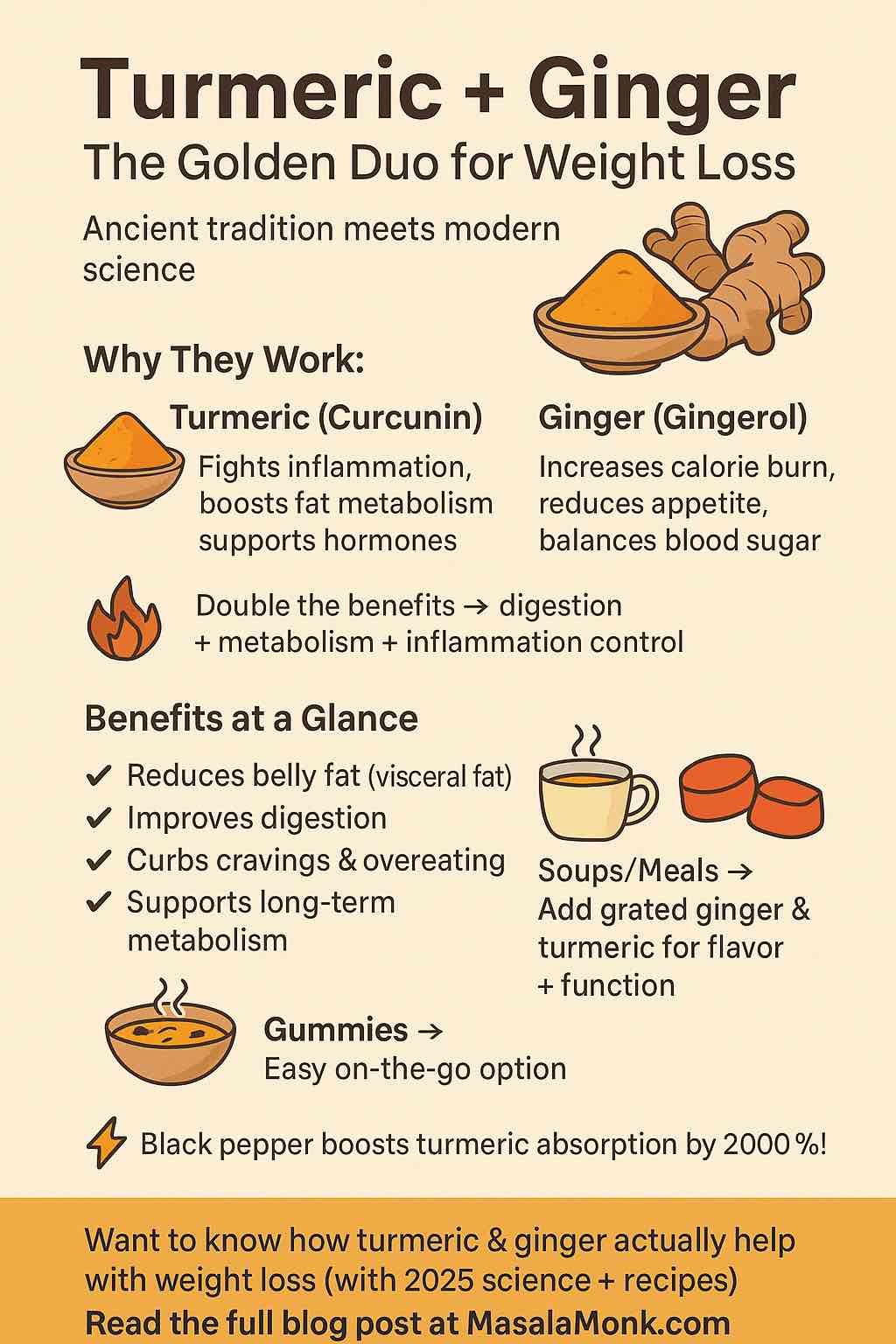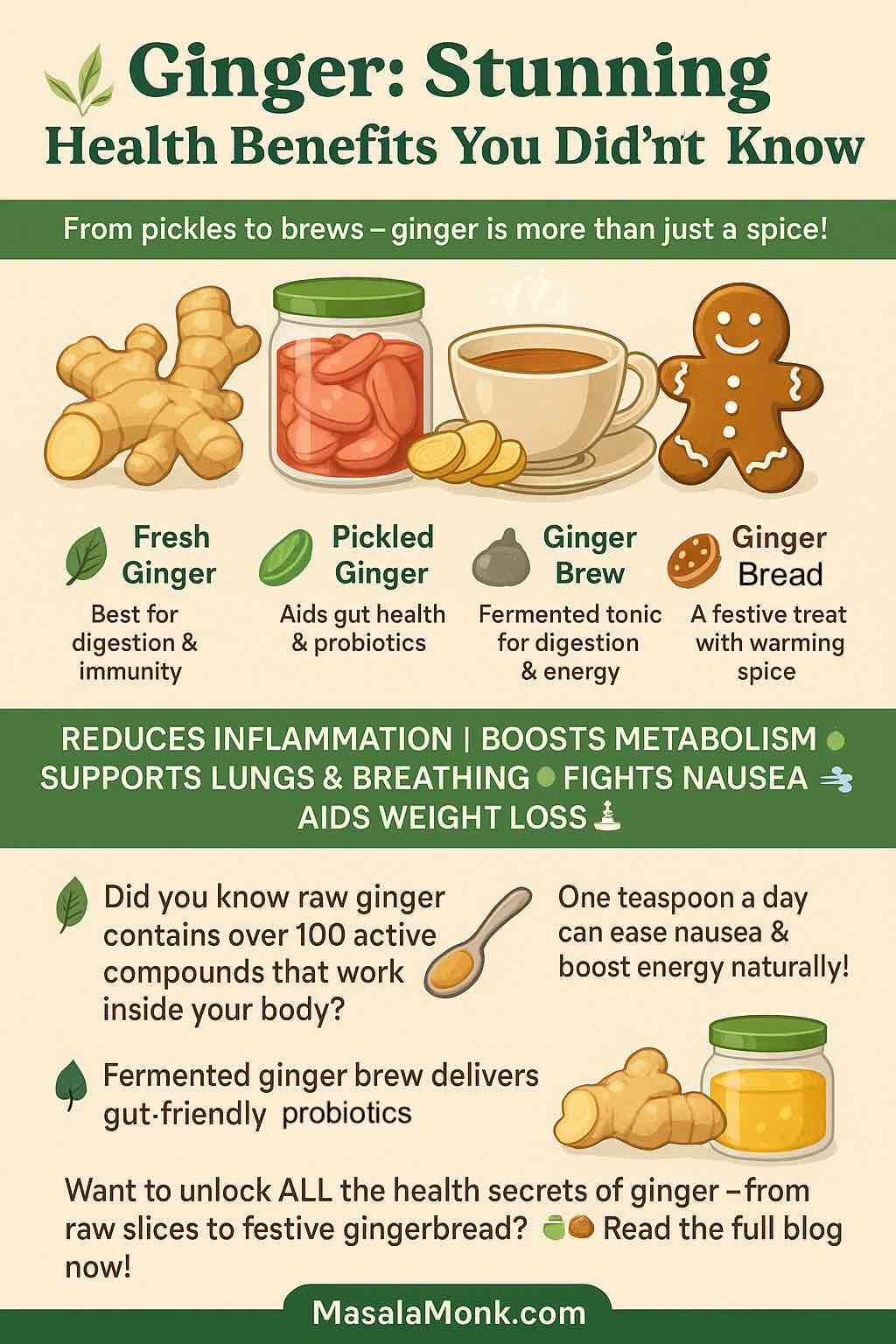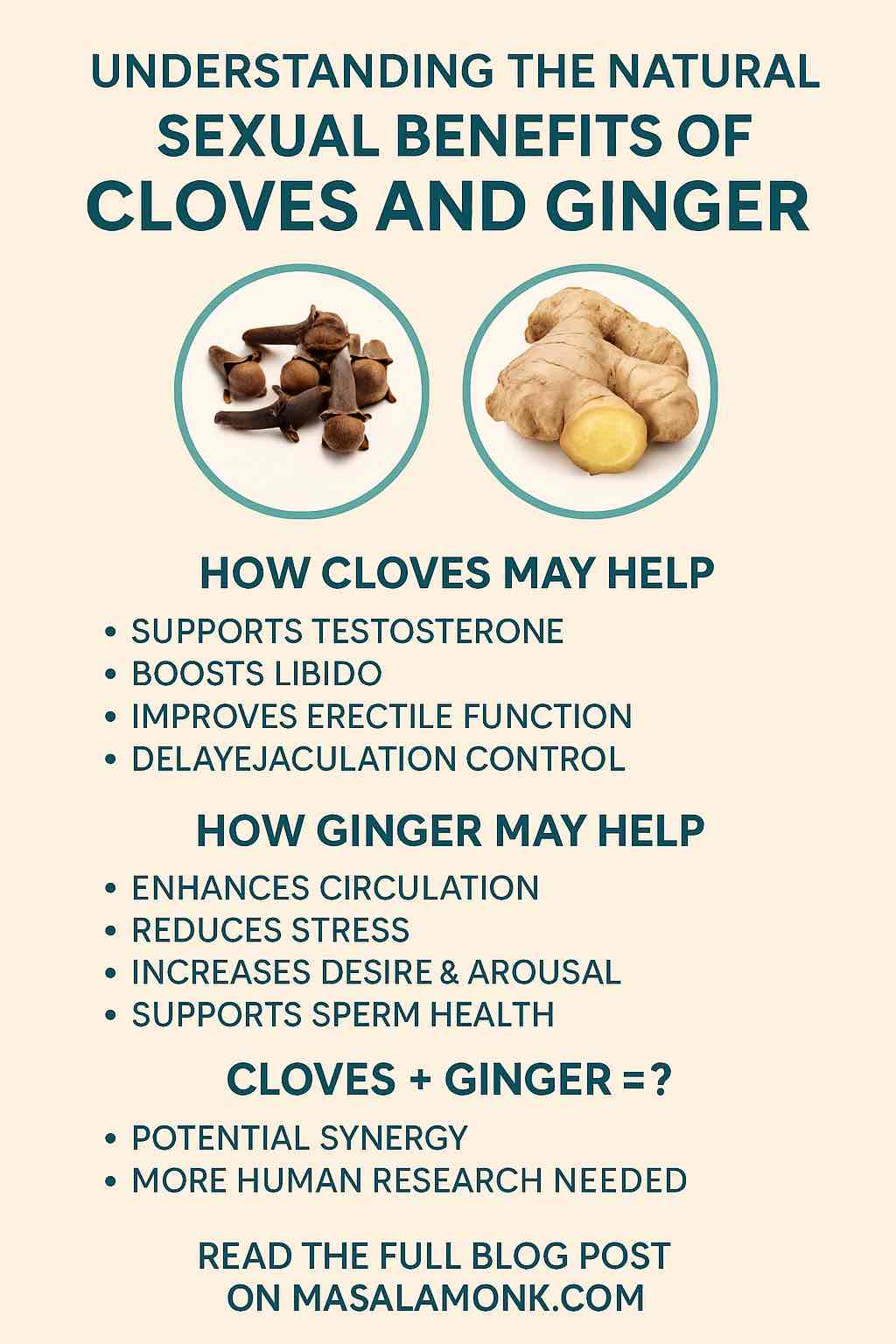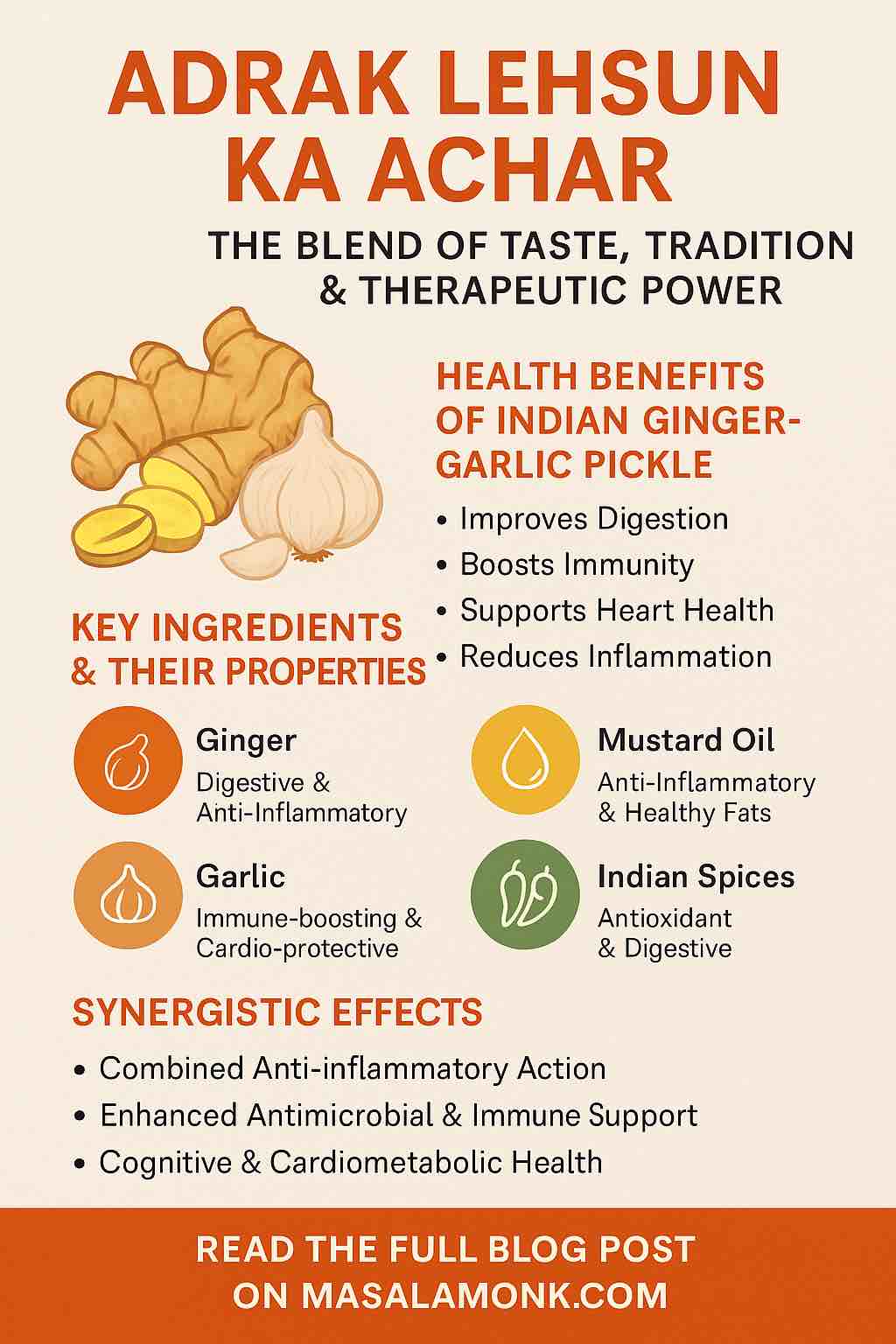
Ginger isn’t a magic wand. However, when you pair it with mindful eating and daily movement, ginger drinks for weight loss can gently support appetite awareness, digestion, and consistency. To keep things real—and delicious—here are seven sippable ideas (tea, water, lemon-ginger, turmeric-ginger-cinnamon, green tea with ginger, cucumber-ginger, and quick ginger shots) along with simple recipes, timing tips, habit tricks, and sensible safety notes. For context, you can skim this friendly overview of ginger tea benefits and a recent meta-analysis on ginger and body weight.
Quick list: ginger tea • ginger water • lemon & ginger tea • turmeric-ginger-cinnamon tea • green tea with ginger • cucumber-ginger water/juice • ginger shots
Ginger Tea for Weight Loss (simple, soothing, effective)
If you want a gentle nudge without fuss, start here. Ginger tea for weight loss is warm, comforting, and easy to make—even on busy mornings.
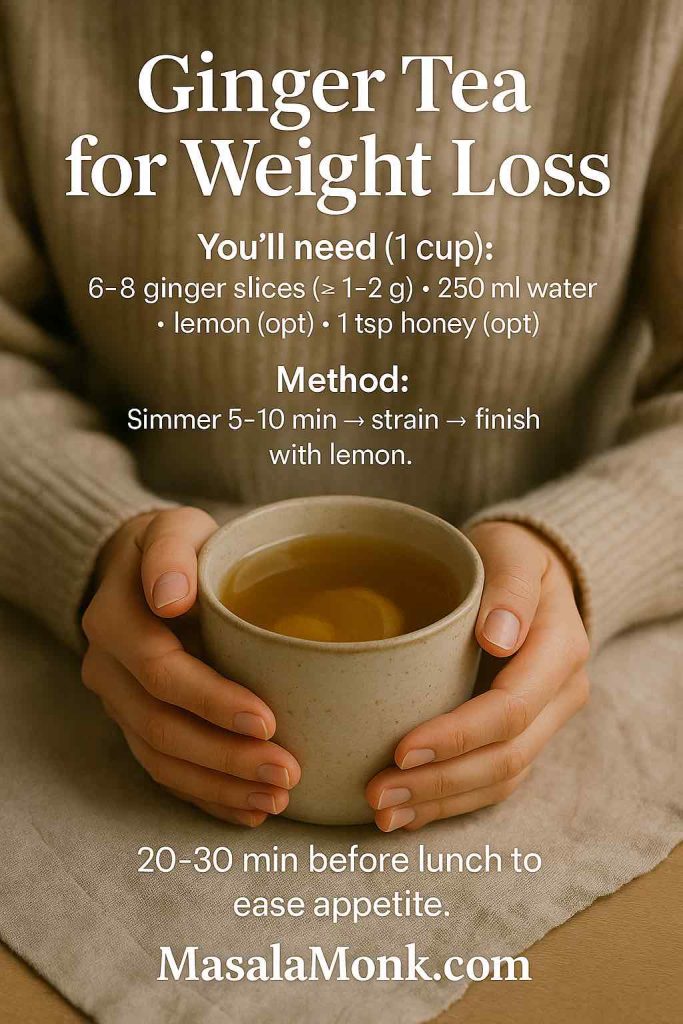
You’ll need (1 cup):
1–2 g fresh ginger (6–8 thin slices) or ½ tsp ginger powder · 250 ml water · optional lemon wedge · 1 tsp honey
Method: Bring water to a simmer, add ginger, and gently bubble for 5–10 minutes. Strain; finish with lemon or a touch of honey if you like.
When to drink (and why it helps): Many folks enjoy a cup before meals to slow down, tune in to fullness, and take the edge off appetite. For more tea ideas that support digestion, explore our best tea for digestion and a broader look at ginger health benefits. If you love quick science reads, here’s a plain-English summary of ginger tea benefits.
Make it yours: Add a squeeze of lemon, swap honey for a few drops of stevia, or fold in a mint leaf for a cooler finish.
Ginger Water for Weight Loss (light, all-day hydration)
Meanwhile, if you prefer something milder you can sip throughout the day, ginger water for weight loss keeps flavor light and hydration high.

You’ll need (1 bottle, ~750 ml):
1 inch (10–12 g) fresh ginger, thinly sliced · 750 ml water · optional 1–2 tsp lemon juice
Method: Drop ginger into your bottle, top with water, and steep 15–60 minutes (or overnight in the fridge). Add lemon just before drinking.
When to drink: First thing in the morning to build the habit, then refill and sip between meals. For refreshing variations, see our cooling cucumber electrolyte quenchers and the benefits of cucumber, lemon & ginger water.
Why timing matters: Some research suggests pre-meal water can reduce immediate energy intake for certain groups—handy while you experiment with what works for you. Try the Harvard explainer and this open-access trial if you like reading the “why.”
Flavor combos to try: Ginger + mint • Ginger + sliced strawberries • Ginger + lime + a pinch of pink salt (hot days).
Lemon and Ginger Tea for Weight Loss (bright and zesty)
Now, if you love a citrus lift, lemon and ginger tea for weight loss brings zing and aroma—great for an afternoon reset. After you brew, you might also like our focused guide: lemon ginger tea for weight loss.
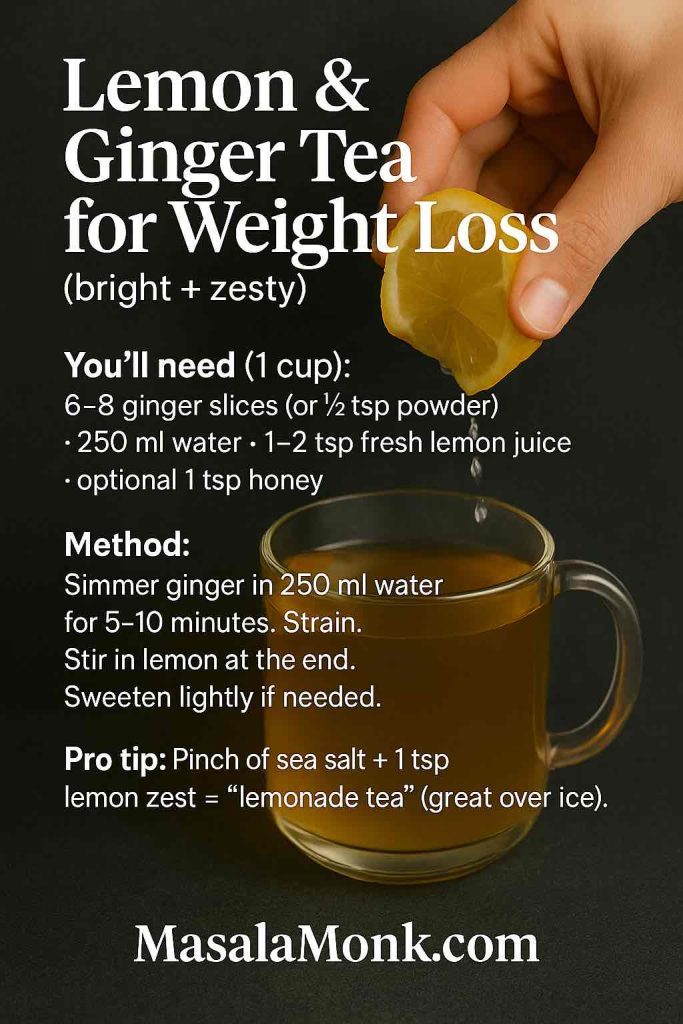
You’ll need (1 cup):
6–8 ginger slices (or ½ tsp powder) · 250 ml water · 1–2 tsp fresh lemon juice · optional 1 tsp honey
Method: Brew ginger tea as above; stir in lemon at the end to keep it bright. Sweeten lightly if needed.
Pro tip: Add a pinch of sea salt and a tsp of lemon zest if you want “lemonade tea” vibes—especially tasty over ice.
Turmeric-Ginger-Cinnamon Tea for Weight Loss (comfort in a cup)
For cozy evenings, turmeric and ginger tea for weight loss with a pinch of cinnamon feels like a hug in a mug. We also unpack the pairing here: turmeric and ginger for effective weight loss.
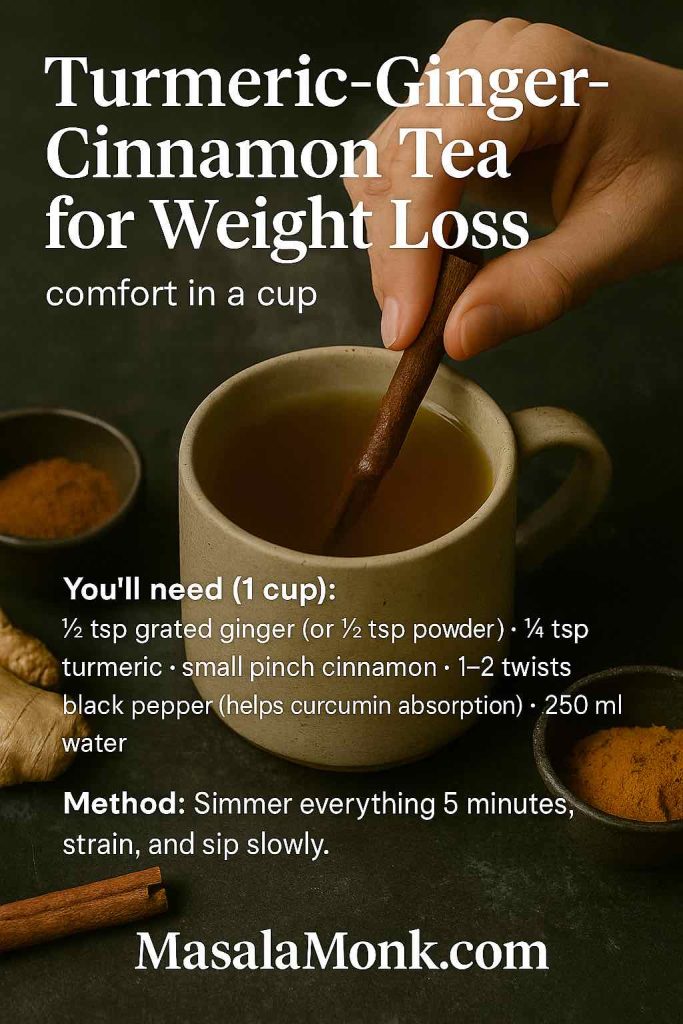
You’ll need (1 cup):
½ tsp grated ginger (or ½ tsp powder) · ¼ tsp turmeric · small pinch cinnamon · 1–2 twists black pepper (helps curcumin absorption) · 250 ml water
Method: Simmer everything 5 minutes, strain, and sip slowly.
Variation: For a brighter morning twist, try these turmeric-orange drinks.
Make-ahead idea: Brew a 2-cup concentrate (double the ingredients), refrigerate up to 48 hours, and reheat a half-cup at night.
Green Tea with Ginger for Weight Loss (fresh + focused)
If you like a gentle lift, ginger and green tea for weight loss pairs ginger’s warmth with green tea’s catechins and a touch of caffeine. For fun ideas, peek at our green tea & spice infusions.
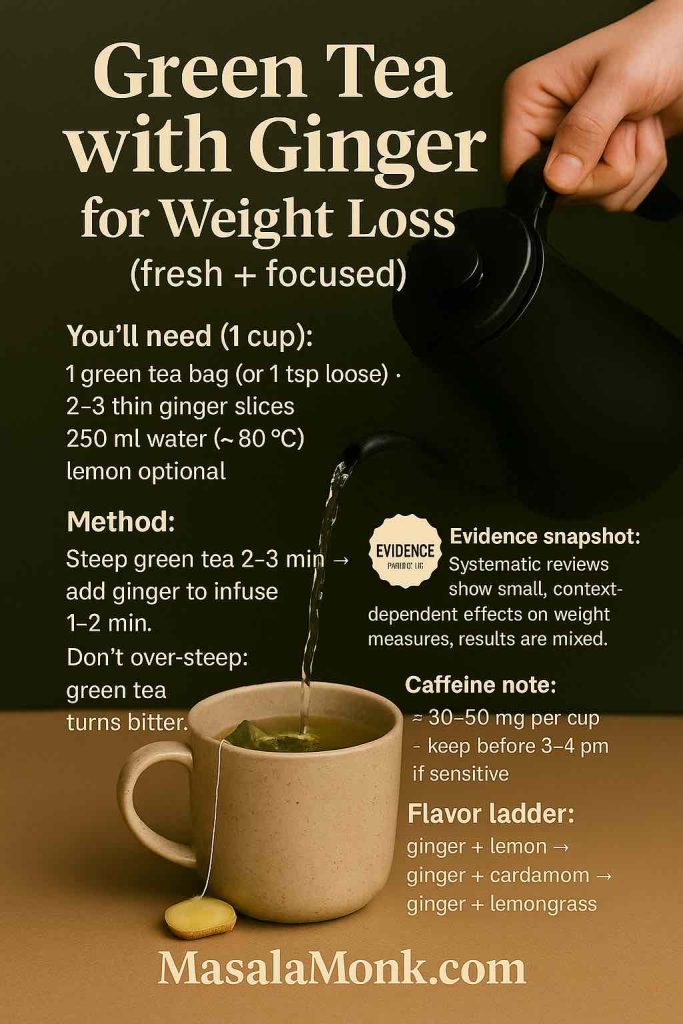
You’ll need (1 cup):
1 green tea bag (or 1 tsp loose) · 2–3 thin ginger slices · 250 ml water (~80°C) · lemon optional
Method: Steep green tea 2–3 minutes, then add ginger to infuse 1–2 more minutes. Don’t over-steep; green tea turns bitter.
Balanced view: Results are mixed but promising in some contexts—see a systematic review on green tea and weight—and remember there’s caffeine; here’s a quick caffeine explainer if you’re curious.
Flavor ladder: Start simple (ginger + lemon), then try ginger + cardamom, and finally ginger + lemongrass for a café-style finish.
Cucumber & Ginger Water / Juice for Weight Loss (cool and crisp)
During warmer months—or anytime you want spa-day vibes—cucumber and ginger juice for weight loss (or infused water) is ultra-refreshing. Build your own variations with our hydrating cucumber drinks and cucumber + lemon water tips.
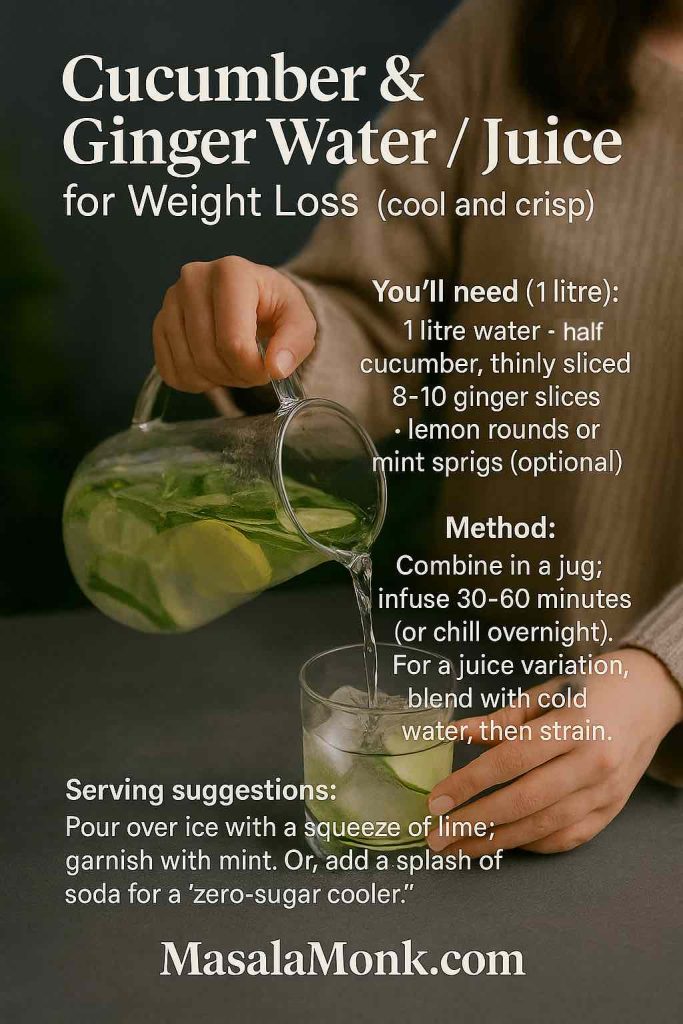
You’ll need (1 litre):
1 litre water · ½ cucumber, thinly sliced · 8–10 ginger slices · lemon rounds or mint sprigs (optional)
Method: Combine in a jug; infuse 30–60 minutes (or chill overnight). For a juice variation, blend with cold water, then strain.
Serving suggestions: Pour over ice with a squeeze of lime; garnish with mint. Or, add a splash of soda for a “zero-sugar cooler.”
Ginger Shots for Weight Loss (quick and punchy)
Finally, for days you want a fast hit of flavor, ginger shots for weight loss are sharp, spicy, and over in seconds. After this base version, explore spicy variations in our wellness shot recipes.
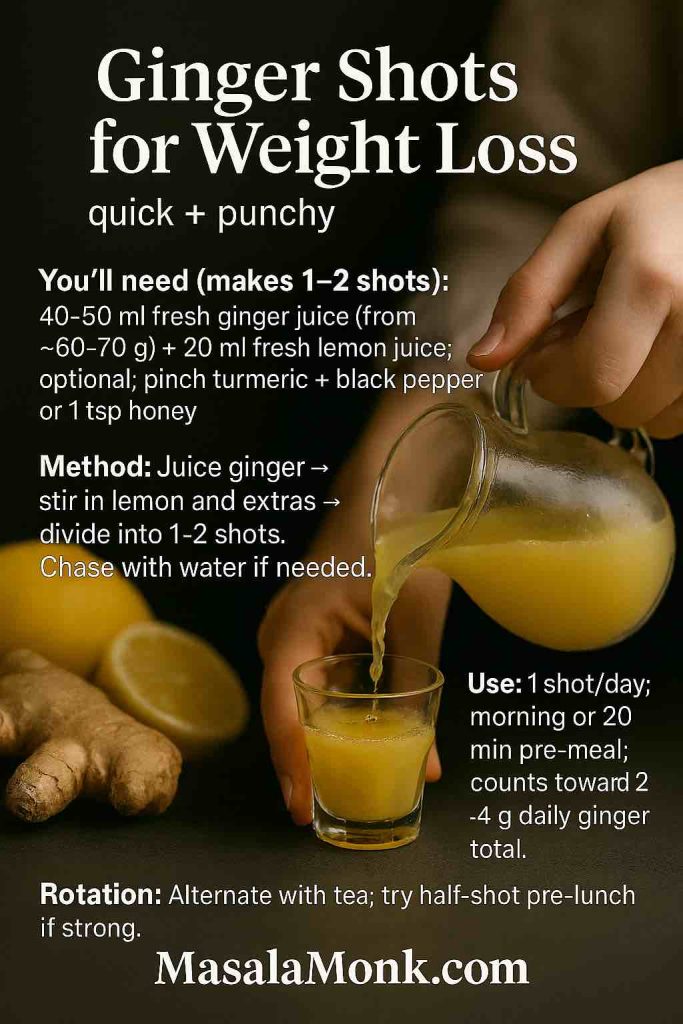
Base recipe (2 small shots):
40–50 ml fresh ginger juice (from ~60–70 g ginger) · 20 ml fresh lemon juice · optional pinch turmeric + black pepper, or 1 tsp honey
Method: Juice ginger; stir in lemon and any extras; divide into 1–2 shots. Chase with water if needed.
Rotation ideas: Alternate shots with tea on different days; or use a half-shot before lunch if a full one feels intense.
Strategically Timing Your Ginger Drinks (to support results)
Because routine beats intensity, here’s a simple approach to ginger drinks for weight loss that fits real life:
- Morning (habit anchor): Ginger water on waking, or a ginger shot if you like a jolt.
- Late morning (focus window): Green tea with ginger on training days; plain ginger tea on rest days.
- Pre-lunch (appetite check): A small cup of ginger tea helps you arrive at meals calmer and more mindful.
- Afternoon (snack swap): Lemon & ginger tea (hot or iced) when cravings hit.
- Evening (wind-down): Turmeric-ginger-cinnamon tea after dinner if you want a cozy, dessert-replacing ritual.
Build-Once, Sip-All-Week (prep tips)
- Batch basics: Slice 2–3 hands of ginger on Sunday; store in an airtight jar.
- Tea concentrate: Simmer 1 litre with generous ginger slices (and optional cinnamon), 15 minutes. Chill. Reheat by the cup.
- Infused water kit: Pre-assemble 3 bottles with sliced ginger + lemon rounds; add water fresh each morning.
- Shot shortcut: If you have a juicer, press a small bottle of ginger-lemon base and use within 48 hours.
Common Mistakes (and easy fixes)
- Too strong, too soon: Start light (short steeps, fewer slices). Build intensity gradually so you actually enjoy it.
- Sweetener creep: If honey’s your thing, pre-measure (½–1 tsp). Or pivot to lemon, mint, or cinnamon for flavor without sugar.
- Caffeine late at night: Keep green tea with ginger earlier in the day; switch to caffeine-free options after 4 pm.
- Expecting miracles: No drink “melts” fat. Use these beverages as habit anchors alongside balanced meals and movement.
Does Ginger Help With Weight Loss? (brief, balanced view)
Let’s be clear: no drink melts fat. Still, regularly enjoying ginger weight loss drinks can support your routine in three practical ways:
- Ritual and consistency: A before-meal drink helps many people slow down and eat more intentionally.
- Flavor for fewer calories: When water tastes good, you naturally sip more and snack less.
- Gentle metabolic nudge: Some trials and reviews suggest small effects on thermogenesis, hunger, and weight measures—modest but meaningful when stacked with daily habits. For context, see this 2019 meta-analysis and a 2024 update.
How Much and Any Safety Notes?
Most people do well with culinary amounts—think roughly 2–4 g ginger/day from drinks and food, and less during pregnancy unless your clinician says otherwise. If you take blood thinners, diabetes or blood-pressure meds, or you’re prone to reflux, go slowly and check with your doctor or pharmacist. These plain-language guides are handy: practical ginger intake & cautions, medication interactions and daily caps, and the UK committee’s safety note on pregnancy.
A Simple 7-Day Ginger Drinks Plan (optional template)
- Day 1–2: Morning ginger water; pre-lunch ginger tea; post-dinner turmeric-ginger-cinnamon.
- Day 3–4: Swap morning water for a ginger shot; keep afternoon lemon-ginger iced.
- Day 5: Green tea with ginger mid-morning; cucumber-ginger water with lunch.
- Day 6: Repeat your favorites; keep caffeine earlier.
- Day 7: Light day—just ginger water + lemon-ginger tea.
Remember, the best ginger drink for weight loss is the one you’ll actually drink—consistently, happily, and alongside balanced meals and movement.
FAQs
1) Does ginger really help with weight loss?
For starters, ginger is not a magic wand; however, it can support your routine. in simple terms, people often notice 3 helpful effects:
- a mild appetite-calming effect before meals,
- slightly better meal-time thermogenesis (your body’s heat production), and
- easier hydration habits when drinks taste good. therefore, when you pair ginger drinks with balanced meals and movement, results feel more consistent over 8–12 weeks.
2) How much ginger should I drink or eat in a day?
As a practical guideline, aim for 2–4 grams of ginger per day from all sources combined (tea, water, shots, food). meanwhile, if you’re just starting, begin with 1 gram/day for 3–4 days, assess how you feel, and then step up slowly. finally, if you’re sensitive, stay closer to 2 grams/day.
3) What’s the best time to drink ginger tea for weight loss?
Timing matters. many people do well with 1 cup (250 ml) 20–30 minutes before lunch to take the edge off appetite. additionally, a morning cup helps habit-building, while an early evening cup (decaf options only) can replace dessert. however, if you’re using green tea with ginger, keep it earlier than 4 pm due to caffeine.
4) Ginger water vs ginger tea: which is better a drink for weight loss?
Both can help; it depends on your routine. ginger tea is warmer and stronger, great before meals; ginger water is lighter and sippable all day. try this split:
- morning: 1 bottle ginger water (750 ml),
- pre-lunch: 1 cup ginger tea (250 ml).
consistency beats perfection, so choose the format you’ll actually drink 5–6 days/week.
5) Fresh ginger or powdered ginger—what should I use?
Both work. fresh ginger (use 6–8 thin slices ≈ 1–2 g) tastes brighter; powdered ginger (½ tsp ≈ 1 g) is convenient and consistent. moreover, if you’re brewing for 10 minutes, fresh shines; if you’re short on time, powder dissolves fast. therefore, pick based on flavor and convenience rather than chasing “perfect.”
6) Lemon and ginger tea drinks for weight loss: any tips?
Yes—keep it simple. brew your ginger base and add 1–2 teaspoons lemon juice right at the end to keep it vibrant. for summer, chill 250 ml and pour over ice; for winter, sip it warm. additionally, try 1 tsp grated lemon zest for a bigger aroma without extra calories.
7) Turmeric, ginger, and cinnamon tea: how do I get the balance right?
Use this friendly ratio for 1 cup (250 ml):
- ½ tsp grated ginger (or ½ tsp powder),
- ¼ tsp turmeric,
- 1 small pinch cinnamon,
- 1–2 twists black pepper.
simmer 5 minutes, then strain. if the spice feels strong, reduce each amount by ⅓ for 3–4 days, then increase gradually.
8) Green tea with ginger: will the caffeine affect my sleep?
Potentially. a typical cup has ~30–50 mg caffeine. consequently, have it before 2–3 pm if you’re sensitive. alternatively, on rest days, switch to caffeine-free ginger tea and keep your evening ritual with a turmeric–ginger–cinnamon cup instead.
9) Cucumber and ginger water or juice: when should I use it?
Use it strategically. first, on hot days or training days, prepare 1 litre and keep it in the fridge; secondly, pour 1 glass (250 ml) 10–15 minutes before meals to slow down eating. finally, if blending, strain for a lighter texture and sip within 24 hours.
10) Ginger shots for weight loss: how often and how much?
Start small. a sensible serving is 1 shot (30–40 ml) made from about 40–50 ml ginger juice + 20 ml lemon juice. use it 1 time/day, preferably morning or 20 minutes pre-meal. importantly, count it toward your 2–4 g/day ginger total; if you also drink tea or water, cap shots at 1.
11) Can ginger drinks burn belly fat specifically?
No drink can “spot reduce” fat, and that’s the honest truth. however, ginger drinks can help you:
- control portions before meals,
- stay hydrated (which often reduces snacking), and
- maintain a steady routine for 8–12 weeks. therefore, your waistline changes because your overall pattern improves, not because ginger targets one area.
12) How long until I notice changes with ginger weight loss drinks?
Be patient. most people need 2–3 weeks to feel habit and appetite changes, and 8–12 weeks to see measurable progress when combined with balanced eating and activity. therefore, pick 2–3 favorite drinks, track them 5–6 days/week, and reassess at week 4.
13) What are common mistakes with ginger tea or ginger water?
There are 5 frequent pitfalls:
- brewing too strong on day one,
- adding too much sweetener (try ½–1 tsp max),
- drinking green tea with ginger too late,
- forgetting to count ginger shots toward your daily total, and
- giving up before week 3. fortunately, each fix is simple—start lighter, time caffeine earlier, and commit to a 21-day streak.
14) Are there any side effects or people who should be cautious?
Yes, a few. ginger can feel spicy and may trigger heartburn in some. meanwhile, if you’re pregnant, have reflux or gallstones, or take blood thinners, diabetes, or blood-pressure medications, start with small amounts (≤1 g/day) and monitor how you feel. finally, if anything seems off—such as persistent discomfort—pause and review your intake.
15) Can I drink ginger tea while intermittent fasting?
Usually, yes—plain ginger tea or ginger water without sweeteners is commonly used during fasting windows. to be precise, keep calories at 0–5 kcal (so, skip honey) and drink 1 cup (250 ml) if you need a warm cue. afterwards, use a ½–1 cup pre-meal to transition into eating more mindfully.
16) What’s a simple daily plan using ginger drinks for weight loss?
Here’s a straightforward 3-point plan:
- morning: 750 ml ginger water (or 1 shot, if you prefer),
- pre-lunch: 1 cup ginger tea (20–30 minutes before),
- evening: 1 cup turmeric–ginger–cinnamon tea.
repeat 5–6 days/week; then, at week 4, keep what you love and adjust what you don’t.
17) How strong should my ginger brew be?
As a baseline, use 6–8 fresh slices (≈1–2 g) per 250 ml water and simmer 5–10 minutes. next, taste and either add 2 slices more or subtract 2 slices on the next cup. eventually, you’ll land on your sweet spot by cup 3 or 4.
18) Can I mix ginger drinks with other weight-loss-friendly ingredients?
Absolutely. start with ginger + lemon (bright), then ginger + mint (cooling), ginger + green tea (focused), and ginger + turmeric + cinnamon (cozy). rotate 2 combos each week for variety, and—most importantly—stick with the ones you genuinely enjoy.

